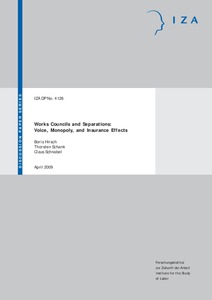Works councils and separations: voice, monopoly, and insurance effects
"Using a large linked employer-employee data set for Germany, we find that the existence of a works council is associated with a lower separation rate to employment, in particular for men and workers with low tenure. While works council monopoly effects show up in all specifications, clear voic...
| Main Authors: | , , |
|---|---|
| Institution: | ETUI-European Trade Union Institute |
| Format: | TEXT |
| Language: | English |
| Published: |
Bonn
2009
IZA |
| Subjects: | |
| Online Access: | https://www.labourline.org/KENTIKA-19187669124919058419-Works-councils-and-separations.htm |
| Summary: | "Using a large linked employer-employee data set for Germany, we find that the existence of a works council is associated with a lower separation rate to employment, in particular for men and workers with low tenure. While works council monopoly effects show up in all specifications, clear voice effects are only visible for low tenured workers. Works councils also reduce separations to non-employment, and this impact is more pronounced for men. Insurance effects only show up for workers with tenure of more than one year. Our results indicate that works councils primarily represent the interests of a specific clientele." |
|---|---|
| Physical Description: | 27 p. Digital |

